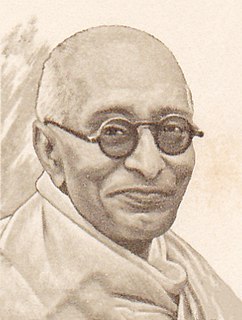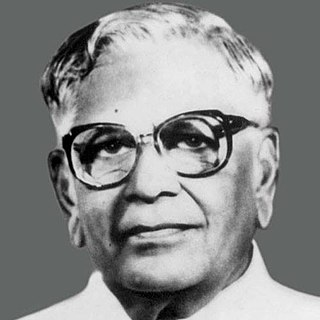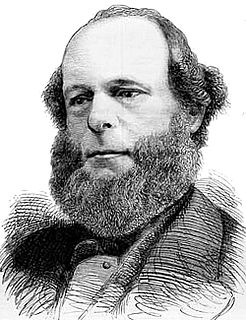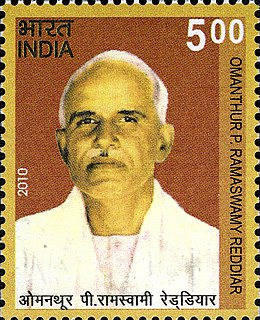
Chakravarti Rajagopalachari, popularly known as Rajaji or C.R., also known as Mootharignar Rajaji, was an Indian statesman, writer, lawyer, and independence activist. Rajagopalachari was the last Governor-General of India, as India soon became a Republic in 1950. He was also the first Indian-born governor-general, as all previous holders of the post were British nationals. He also served as leader of the Indian National Congress, Premier of the Madras Presidency, Governor of West Bengal, Minister for Home Affairs of the Indian Union and Chief Minister of Madras state. Rajagopalachari founded the Swatantra Party and was one of the first recipients of India's highest civilian award, the Bharat Ratna. He vehemently opposed the use of nuclear weapons and was a proponent of world peace and disarmament. During his lifetime, he also acquired the nickname 'Mango of Salem'.

Ramaswamy Venkataraman was an Indian lawyer, Indian independence activist and politician who served as a Union Minister and as the eighth president of India. Venkataraman was born in Rajamadam village in Tanjore district, Madras Presidency. He studied law and practised in the Madras High Court and the Supreme Court of India. In his young age, he was an activist of the Indian independence movement and participated in the Quit India Movement. He was appointed as the member of the Constituent Assembly and the provisional cabinet. He was elected to the Lok Sabha four times and served as Union Finance Minister and Defence Minister. In 1984, he was elected as the seventh vice president of India and in 1987, he became the eighth President of India and served from 1987 to 1992. He also served as a State minister under K. Kamaraj and M. Bhaktavatsalam.

Richard Plantagenet Campbell Temple-Nugent-Brydges-Chandos-Grenville, 3rd Duke of Buckingham and Chandos, styled Earl Temple until 1839 and Marquess of Chandos from 1839 to 1861, was a British soldier, politician and administrator of the 19th century. He was a close friend and subordinate of Benjamin Disraeli and served as the Secretary of State for the Colonies from 1867 to 1868 and Governor of Madras from 1875 to 1880.

The Madras Presidency, or the Presidency of Fort St. George, also known as Madras Province, was an administrative subdivision (presidency) of British India. At its greatest extent, the presidency included most of southern India, including the whole of the Indian state of Tamil Nadu, and parts of Andhra Pradesh, Kerala, Karnataka, Telangana, Odisha and the union territory of Lakshadweep. The city of Madras was the winter capital of the Presidency and Ootacamund or Ooty, the summer capital. The coastal regions and northern part of Island of Ceylon at that time was a part of Madras Presidency from 1793 to 1798 when it was created a Crown colony. Madras Presidency was neighboured by the Kingdom of Mysore on the northwest, Kingdom of Cochin on the southwest, and the Kingdom of Hyderabad on the north. Some parts of the presidency were also flanked by Bombay Presidency (Konkan) and Central Provinces and Berar.

SachivottamaSir Chetput Pattabhiraman Ramaswami Iyer, KCSI, KCIE, popularly known as Sir C. P., was an Indian lawyer, administrator and politician who served as the Advocate-General of Madras Presidency from 1920 to 1923, Law member of the Executive council of the Governor of Madras from 1923 to 1928, Law member of the Executive Council of the Viceroy of India from 1931 to 1936 and the Diwan of Travancore from 1936 to 1947. Ramaswami Iyer was born in 1879 in Madras city and studied at Wesley College High School and Presidency College, Madras before qualifying as a lawyer from the Madras Law College. He practised as a lawyer in Madras and succeeded S. Srinivasa Iyengar as the Advocate-General of the Madras Presidency. He subsequently served as the Law member of the Governor of Madras and of the Viceroy of India before being appointed Diwan of Travancore in 1936.

Major-General Sir Thomas Munro KCB was a Scottish soldier and colonial administrator. He served as an East India Company Army officer and statesman, in addition to also being the governor of Madras Presidency.

Tanguturi Prakasam Pantulu was an Indian politician and freedom fighter, chief minister of the Madras Presidency, and subsequently became the first chief minister of the new Andhra state, created by the partition of Madras State along linguistic lines. He was also known as Andhra Kesari. The Andhra Pradesh government issued G.O RT-2500 on 10 August 2014 declaring his birth anniversary a state festival. Andhra Kesari 9 feet Statue in Parliament houses, Statue was Unveiled by Kocheril Raman Narayanan, Presidents of India on 5 May 2000. Andhra Kesari it was the first Biopic Movies on CMs, which was Directed by Vijayachander, It was released on 1 November 1983, the Andhra Pradesh Formation day.

Paramasiva Subbarayan Gounder(11 September 1889 – 6 October 1962) was an Indian politician, freedom fighter and diplomat and was the Chief Minister of Madras Presidency, India's ambassador to Indonesia and Union Minister of Transport and Communications in Jawaharlal Nehru's government. He was the father of General P. P. Kumaramangalam who served as India's Chief of Army staff and politician Mohan Kumaramangalam. He was also the grandfather of INC and BJP politician and Union Minister Rangarajan Kumaramangalam.
Raja Sri Ravu SvetachalapatiSir Ramakrishna Ranga RaoKCIE was an Indian politician and zamindar who served as the Chief Minister of Madras Presidency from 5 November 1932 to 4 April 1936 and 24 August 1936 to 1 April 1937.

Omandur Ramasamy Reddiyar was an Indian freedom-fighter and politician of the Indian National Congress. He served as the Premier of Madras Presidency from 23 March 1947 to 6 April 1949.

Tamil Nadu Legislative Council was the upper house of the former bicameral legislature of the Indian state of Tamil Nadu. It began its existence as Madras Legislative Council, the first provincial legislature for Madras Presidency. It was initially created as an advisory body in 1861, by the British colonial government. It was established by the first Indian Council Act of 1861, enacted in the British parliament in the aftermath of the Indian Rebellion of 1857. Its role and strength were later expanded by the second Council Act of 1892. Limited election was introduced in 1909. The Council became a unicameral legislative body in 1921 and eventually the upper chamber of a bicameral legislature in 1937. After India became independent in 1947, it continued to be the upper chamber of the legislature of Madras State, one of the successor states to the Madras Presidency. It was renamed as the Tamil Nadu Legislative Council when the state was renamed as Tamil Nadu in 1969. The Council was abolished by the M. G. Ramachandran administration on 1 November 1986. In 2010 the DMK regime headed by M. Karunanidhi tried to revive the Council. The current AIADMK regime has expressed its intention not to revive the council and has passed a resolution in the Tamil Nadu Legislative Assembly in this regard.

Sir Amaravati Seshayya Sastri, or Sashiah Sastri, was an Indian administrator who served as the Diwan of Travancore from May 1872 to 4 May 1877 and as the Diwan of Pudukkottai from 1878 to 1894. He is credited with having modernized the city of Pudukkottai.
Rao Bahadur Sir Annepu Parasuramdas PatroKCIE was an Indian politician, zamindar and education minister in the erstwhile Madras Presidency.
Diwan Bahadur Sir Tinnevely Nelliappa Sivagnanam Pillai was an Indian lawyer, civil servant and politician from the Madras Presidency. He belonged to the Justice Party. He served as the Minister of Development in the government of the Raja of Panagal from 1923 to 1926.

Tiruppur Subrahmanya Avinashilingam Chettiar was an Indian lawyer, politician, freedom-fighter and Gandhian. He served as the Education Minister of Madras Presidency from 1946 to 1949 and was responsible for introducing Tamil as the medium of instruction. He is also credited with having commissioned the creation of the first Tamil encyclopedia.

Bezawada Ramachandra ReddyCBE was an Indian politician of the Justice Party and one of the founders of the Swatantra Party. He served as the President of the Madras Legislative Council from 1930 to 1937. Ramachandra Reddy was a relative of Indian National Congress politician Bezawada Gopala Reddy.

Kala Venkata Rao was an Indian independence activist and politician. He served as the Minister for Revenue in the governments of the Madras Presidency and Andhra Pradesh. He also served as the Minister of Finance in the latter.
The first legislative council election for the Madras Presidency after the establishment of a bicameral legislature by the Government of India Act of 1935 was held in February 1937. The Indian National Congress obtained a majority by winning 27 out of 46 seats in the Legislative Council for which the elections were held. This was the first electoral victory for the Congress in the presidency since elections were first conducted for the Council in 1920 and C. Rajagopalachari (Rajaji) became the Chief Minister. The Justice Party which had ruled the presidency for most of the previous 17 years was voted out of power. Congress also won the Legislative assembly election held simultaneously.
Gali Muddu Krishnama Naidu was an Indian politician from Andhra Pradesh. He served as Minister of Higher Education, Andhra Pradesh. He was elected for a record six terms to the Andhra Pradesh Legislative Assembly, five times from the former Puttur constituency and once from the Nagari constituency.

Diwan BahadurSir Narasimha Ayyangar Gopalaswami Ayyangar, Member of the Drafting Committee of the Constitution, was a leader of the Rajya Sabha and a cabinet minister in the Government of India, first as a minister without portfolio but looking after Kashmir Affairs, and later as the railway minister.














